GA 4
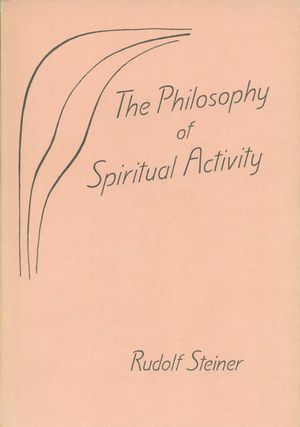
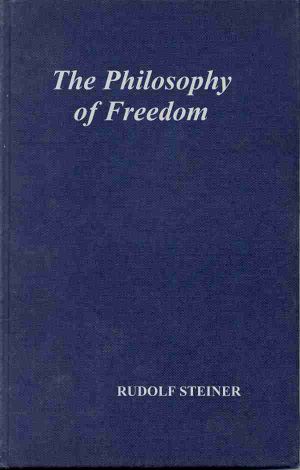
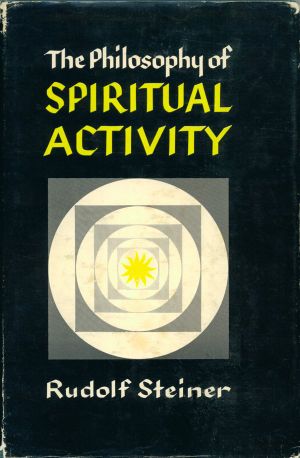
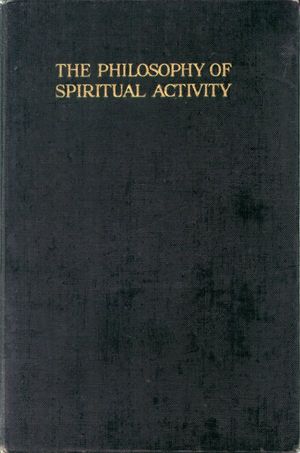
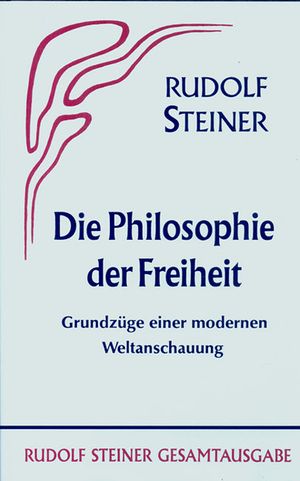
The Philosophy of Spiritual Activity - The Philosophy of Freedom
The Basic Features of a Modern World View. Results of Soul Observation Arrived at by the Scientific Method
In his main philosophical work, which at the same time forms the foundation of anthroposophical spiritual science, Rudolf Steiner deals with fundamental questions of the cognitive process and establishes an ethics based on free spiritual individuality. The concept of moral intuition is developed and the basic maxim of free human beings is formulated.
Introduction to the Work
Rudolf Steiner himself had a technical and scientific education, not a philosophical one; the latter he acquired mainly through self-study. He certainly approved of the development of modern technical-scientific thinking. However, he also saw that people would have to lose themselves more and more to external events if a correspondingly strong counterweight was not created. And this consists in the strongest possible deepening of the innermost human being. Rudolf Steiner wanted to provide the impetus for this with his philosophy of freedom.
The book consists of two main parts, each of which is divided into seven chapters. The "Science of Freedom", the first main part, poses the core question: "Is man in his thinking and acting a spiritually free being or is he under the constraint of a purely natural law-like iron necessity?" This question is more topical than ever at the beginning of the 21st century. Brain research, which has taken off in a big way in recent decades, declares - supported by a wealth of empirical evidence - not only human freedom but also the human "I" to be a mere illusion, rising like a bubble from largely unconscious brain processes that have gradually emerged in the course of natural evolution. That an action whose true reasons we do not see through cannot be free is evident. "But what about one whose reasons are known?" This raises the question of the nature and value of thinking, for without it no knowledge is possible, not even of the reasons that determine our actions.
Observation and thinking are the two starting points for all conscious human striving for knowledge. I may observe a horse for as long as I like, but the concept of the horse will never emerge of its own accord before I have formed it myself through thinking. Consciousness is the arena where concept and observation meet. Only in their union do I grasp the full reality.
Now it is in the peculiar nature of thinking that we carry it out, but do not usually observe it, because we are completely devoted to the object we are thinking about. We have to create a state of exception, as it were, if we want to observe our own thinking (→ observation of thinking). Every human being can do this, and it is the most important observation he can make, because now the consciousness is directed in continuous clarity exclusively towards his own mental activity. He grasps himself as a spiritual being and awakens to the actual "consciousness of his humanity" - this is the true meaning of the word "anthroposophy", which Rudolf Steiner used to describe the spiritual science he founded years later.
Contrary to popular opinion, thinking is not abstract and empty of content, but produces its own content, in which, however, the essence of the things I observe is revealed. Of course, we can make many mistakes and be subject to errors before we apply the right concepts to things. In the end, however, their lawfulness is expressed in them. Thus thinking is at the same time an actively active mental organ of perception. I can only recognise that a thrown stone follows an approximately parabolic path if I have formed the concept of the parabola through thinking. I can never gain it through external observation. It is present to me through intuition, through a purely spiritual experience of a purely spiritual content. The physicist Walter Heitler rightly said: "According to this, the law of nature would be an archetype, an "idea" - in the sense of the Greek word Eidea - which nature follows and which man can perceive. This is then what is called the idea. Through this archetype man is connected with nature."[1] The Austrian physicist and co-founder of quantum theory Wolfgang Pauli emphasised that these "ideas" are not to be understood merely as powerless thought images, but at the same time also represent forces that are actually active in nature: "The ordering and regulating must be placed beyond the distinction between physical and psychic - just as Plato's "ideas" have something of "concepts" and also something of "natural forces" (they produce effects of their own accord). I am very much in favour of calling this "ordering and regulating" "archetypes"; but it would then be inadmissible to define these as psychic contents. Rather, the inner images mentioned ("dominants of the collective unconscious" according to Jung) are the psychic manifestation of the archetypes, which, however, would also have to produce, generate, condition everything natural in the behaviour of the body world. The natural laws of the bodily world would then be the physical manifestation of the archetypes."[2]
"The reality of freedom" is dealt with in the second main part of the "Philosophy of Freedom", in which Rudolf Steiner outlines the foundations of a future ethical individualism. Those who allow themselves to be guided in their actions only by their drives, by habits or by externally given commandments do not act freely. Only those who draw the reasons for their actions from pure thinking act freely and self-determined. Then they act out of moral intuition, through which they determine the lawfulness of their actions themselves, adapt it to the given life situation through moral imagination and implement it concretely through an appropriate moral technique. Nothing compels the free man; he acts out of insight and love for what he does. Misunderstanding is impossible between morally free people, since they draw their individual moral ideals from the world of ideas common to all. This gives rise to the oft-quoted basic maxim of free people: "Living in the love of action and letting live in the understanding of the will of others is the fundamental maxim of free men."
Finally, Rudolf Steiner clarifies "The Last Questions" and discusses "The Consequences of Monism", the worldview oriented towards unity that he advocates. Finally, there is a first and second appendix.
Literature
- Rudolf Steiner: The Philosophy of Spiritual Activity. The Basic Features of a Modern World View. Results of Soul Observation Arrived at by the Scientific Method, translated from the German by William Lindeman, Anthroposophic Press 1986, ISBN 0-88010-156-3 rsarchive.org
- Rudolf Steiner: The Philosophy of Freedom. The Basis for a Modern World Conception, translated by Michael Wilson, Rudolf Steiner Press 1964 rsarchive.org
- Rudolf Steiner: The Philosophy of Spiritual Activity. The Basis for a Modern World Conception, Introduction by Hugo S. Bergman, Ph.D., edited, and with Notes by Paul M. Allen, translated from the German by Rita Stebbing, Rudolf Steiner Publications, Inc. 1963, ISBN 62-22389 rsarchive.org
- Rudolf Steiner: Philosophy of Spiritual Activity. Fundamentals of a Modern World Conception, Sixth edition, based on the original authorized Translation by Prof. and Mrs. R. F. Alfred Hoernlé, revised and amended by Hermann Poppelbaum, Phil.D., Rudolf Steiner Publishing Company, London 1939
German
- Rudolf Steiner: Die Philosophie der Freiheit, GA 4 (1995), ISBN 3-7274-0040-4; Tb 627, ISBN 978-3-7274-6271-9 English: rsarchive.org German: pdf pdf(2) html mobi epub archive.org
- Rudolf Steiner, Christian Clement (Hrsg.): Schriften. Kritische Ausgabe / Band 2: Philosophische Schriften: Wahrheit und Wissenschaft. Die Philosophie der Freiheit, frommann-holzboog, Stuttgart-Bad Cannstatt 2016, ISBN 978-3772826320
- Rudolf Steiner: Die Philosophie der Freiheit, Mit beiden Ausgaben (1894 u. 1918) im Vergleich, Rudolf Steiner Ausgaben, 3. Aufl. 2015, ISBN 978-3-86772-072-4
Originalausgaben
Supplementary remarks on the «Philosophy of Freedom»
- Rudolf Steiner: Mein Lebensgang, GA 28 (2000), ISBN 3-7274-0280-6 English: rsarchive.org German: pdf pdf(2) html mobi epub archive.org
- Rudolf Steiner: Fachwissenschaften und Anthroposophie, GA 73a (2005), ISBN 3-7274-0735-2 English: rsarchive.org German: pdf pdf(2) html mobi epub archive.org
- Rudolf Steiner: Anthroposophie – Psychosophie – Pneumatosophie, GA 115 (2001), ISBN 3-7274-1150-3 English: rsarchive.org German: pdf pdf(2) html mobi epub archive.org
- Rudolf Steiner: Meditative Betrachtungen und Anleitungen zur Vertiefung der Heikunst, GA 316 (2003), ISBN 3-7274-3160-1 English: rsarchive.org German: pdf pdf(2) html mobi epub archive.org
 |
References to the work of Rudolf Steiner follow Rudolf Steiner's Collected Works (CW or GA), Rudolf Steiner Verlag, Dornach/Switzerland, unless otherwise stated.
Email: verlag@steinerverlag.com URL: www.steinerverlag.com. Index to the Complete Works of Rudolf Steiner - Aelzina Books A complete list by Volume Number and a full list of known English translations you may also find at Rudolf Steiner's Collected Works Rudolf Steiner Archive - The largest online collection of Rudolf Steiner's books, lectures and articles in English. Rudolf Steiner Audio - Recorded and Read by Dale Brunsvold steinerbooks.org - Anthroposophic Press Inc. (USA) Rudolf Steiner Handbook - Christian Karl's proven standard work for orientation in Rudolf Steiner's Collected Works for free download as PDF. |
Anthroposophical secondary literature
- Frank Teichmann: Auferstehung im Denken: Der Christusimpuls in der "Philosophie der Freiheit" und in der Bewusstseinsgeschichte, Verlag Freies Geistesleben 1996, ISBN 978-3772516009
- Karl-Martin Dietz (Hrsg.): Rudolf Steiners "Philosophie der Freiheit" - Eine Menschenkunde des höheren Selbst: Beiträge zur Philosophie der Freiheit - Rudolf Steiner - 100 Jahre nach ihrem Erscheinen, Verlag Freies Geistesleben 1993, ISBN 978-3772511646
- Karl-Martin Dietz (Hrsg.): Erfahrung des Denkens: Zum Studium der "Philosophie der Freiheit" Rudolf Steiners. Band 1: Kapitel 1-3, Verlag Freies Geistesleben 1996, ISBN 978-3772516016
- Thomas Kracht (Hrsg.): Erkennen und Wirklichkeit: Zum Studium der "Philosophie der Freiheit" Rudolf Steiners. Band 2: Kapitel 4-7, Verlag Freies Geistesleben 2001, ISBN 978-3772516023
- Herbert Witzenmann: Die Philosophie der Freiheit als Grundlage künstlerischen Schaffens: Teil I: Die Philosophie der Freiheit als Gedankenkunstwerk. Teil II: Die Philosophie der Freiheit als Schulungsweg des Künstlers, 2. erweiterte Auflage, Gideon Spicker Verlag 1988, ISBN 978-3857041525
- Massimo Scaligero: Die Logik als Widersacher des Menschen. Der Mythos der Wissenschaft und der Weg des Denkens. Einführung von Michael Kirn. Urachhaus, Stuttgart 1991, ISBN 3-87838-686-9
- Massimo Scaligero: Traktat über das lebende Denken. Ein Weg zur Überwindung der abendländischen Philosophien, des Yoga und des Zen. Urachhaus, Stuttgart 1993, ISBN 3-87838-966-3
- Massimo Scaligero: Das Licht. Die Entdeckung der schöpferischen Imagination. Nachwort von Karen Swassjan. Edition Tertium, Ostfildern 1994, ISBN 3-930717-04-2
- Bernardo J. Gut: Inhaltliches Denken und formale Systeme – Der platonische Standpunkt in Logik, Mathematik und Erkenntnistheorie, Verlag Rolf Kugler, Oberwil bei Zug 1979 [1]
- Jürgen Strube: Die Beobachtung des Denkens: Rudolf Steiners 'Philosophie der Freiheit' als Weg zur Bildekräfte-Erkenntnis, 3. Auflage, Verlag für Anthroposophie 2017, ISBN 978-3037690239
- Renatus Ziegler: Intuition und Ich-Erfahrung: Erkenntnis und Freiheit zwischen Gegenwart und Ewigkeit, Verlag Freies Geistesleben 2006, ISBN 978-3772517853
- Renatus Ziegler: Dimensionen des Selbst: Eine philosophische Anthropologie, Verlag Freies Geistesleben 2013, ISBN 978-3772524974
- Otto Jachmann: Denken wird Wahrnehmung: Die Philosophie von Brentano, Husserl, Heidegger und Derrida und die Anthroposophie, Verlag Christian Möllmann 2009, ISBN 978-3899791266
- Dietrich Rapp: TATORT Erkenntnisgrenze: Die Kritik Rudolf Steiners an Immanuel Kant, Menon-Verlag 2012, ISBN 978-3921132487
- Marek B. Majorek: Rudolf Steiners Geisteswissenschaft: Mythisches Denken oder Wissenschaft?, 2 Bände, Verlag Narr Francke Attempto, Tübingen 2015, ISBN 978-3772085635, eBook: ASIN B0714F4N5R
- Peter Heusser: Anthroposophie und Wissenschaft: Eine Einführung. Erkenntniswissenschaft, Physik, Chemie, Genetik, Biologie, Neurobiologie, Psychologie, Philosophie des Geistes, Anthropologie, Anthroposophie, Medizin, Verlag am Goetheanum, Dornach 2016, ISBN 978-3723515686
- Johannes Weinzirl (Hrsg.), Peter Heusser (Hrsg.): Was ist Geist?, Wittener Kolloquium für Humanismus, Medizin und Philosophie, Band 2, Königshausen u. Neumann 2014, ISBN 978-3826052224
- Peter Heusser, Johannes Weinzirl: Rudolf Steiner: Seine Bedeutung für Wissenschaft und Leben heute, Schattauer Verlag 2013, ISBN 978-3794529476, eBook ASIN B07N91XPKK
- Christoph Hueck: Intuition - das Auge der Seele. Die Darstellung des intuitiven Erkennens im schriftlichen Werk Rudolf Steiners, Akanthos Akademie Edition, Books on Demand 2016, ISBN 978-3741298264; eBook ASIN B01N0H7HXN
- Christoph Hueck: Philosophie als Initiation: Die sieben philosophischen Schriften Rudolf Steiners als spiritueller Schulungsweg, Books on Demand 2017, ISBN 978-3746046785; eBookASIN B0788R72FS
- Clemens Horvat: Die Paulus-Briefe und Rudolf Steiners Philosophie der Freiheit, 2. Auflage, Books on Demand 2019, ISBN 978-3748141877, eBook ASIN B07W4LSC73
- Clemens Horvat: Die Wirklichkeit der Freiheit: Zu den erkenntniswissenschaftlichen und christologischen Grundlagen der Anthroposophie, 5. Auflage, Books on Demand 2017, ISBN 978-3743137776, eBook ASIN B06XPKVVXP
Criticism
- Bernhard Kallert: Die Erkenntnistheorie Rudolf Steiners. Der Erkenntnisbegriff des objektiven Idealismus, Verlag freies Geistesleben, Stuttgart 1960, ISBN 978-3-7725-0612-3
- Gerhard Hahn: Die Freiheit der Philosophie. Eine Fundamentalkritik der Anthroposophie, Licet Verlag Göttingen 1995, ISBN 978-3980422505
- Hartmut Traub: Philosophie und Anthroposophie, Verlag W. Kohlhammer, Stuttgart 2011, ISBN 9783170220195
- David W. Wood: On the spirit and letter of Rudolf Steiner’s philosophy. A critical reading of Hartmut Traub’s Philosophie und Anthroposophie, in: Research on Steiner Education Vol.4 No.1, 2013, pp. 181-201 academia.edu
- Jaap Gerhard Sijmons: Phänomenologie und Idealismus: Struktur und Methode der Philosophie Rudolf Steiners, Schwabe Verlag, Basel 2008, ISBN 978-3796522635
- Helmut Zander: Anthroposophie in Deutschland. Theosophische Weltanschauung und gesellschaftliche Praxis 1884–1945, 2 Bände, Vandenhoeck & Ruprecht, Göttingen 2007, ISBN 978-3-525-55452-4. (Habilitationschrift).
- Helmut Zander: Rudolf Steiner. Die Biographie, Piper, München 2011, ISBN 978-3-492-05448-5
